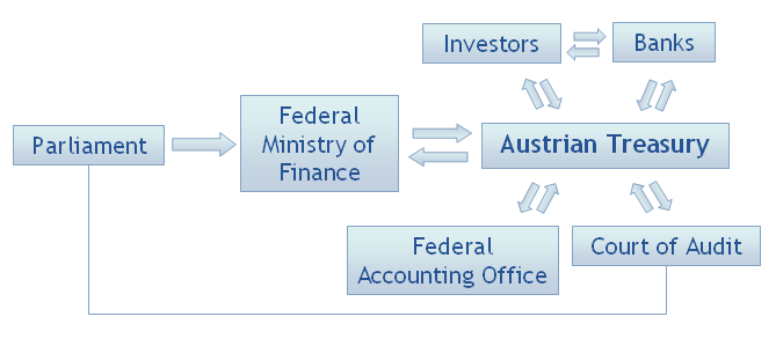The Oesterreichische Bundesfinanzierungsagentur is the treasury of the Republic of Austria and acts in its name and for its account. Established in 1993, the Austrian Treasury is wholly owned by the Republic of Austria, represented by the Federal Ministry of Finance.
Institutional framework
The Austrian parliament passes the Federal Budget Act (Bundesfinanzgesetz, BFG), thus approving the Federal government’s budget and the issuance of new debt for the year. Furthermore the Parliament approves the Federal Budget Accounting Act (Bundeshaushaltsgesetz, BHG) and the Federal Medium-Term Expenditure Framework Act (BFRG). The BHG defines the parameters (e.g. the maximum tenor) for the management of the federal government’s debt and the BFRG prescribes binding ceilings on expenditures for four years in advance with respect to the headings "cash and interest".
According to the BHG, the Federal Minister of Finance is responsible for the budget and public finances within the federal government. The Federal Financing Act (Bundesfinanzierungsgesetz, BFinG) assigns the management of public debt to the Austrian Treasury, which is thereby authorised to act in the name and for the account of the Republic of Austria. Within the framework of an institutionalised dual-control principle, the Federal Accounting Office (Buchhaltungsagentur des Bundes, BHAG) conducts all transactions relating to federal debt. All debt certificates are countersigned by the president of the Court of Audit (Rechnungshof).
The activities of the Austrian Treasury are audited by internal auditors (outsourced to an independent accountant), a certified public accountant, the Austrian Court of Audit and supervised by the Supervisory Board. Additionally, the internal audit of the Ministry of Finance is entitled to review the activities of the Austrian Treasury. The Court of Audit submits the annual Federal Financial Accounts, including the debt-financing-related accounting, to parliament every year.


